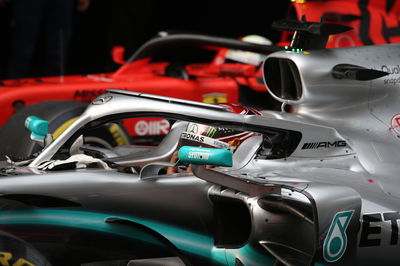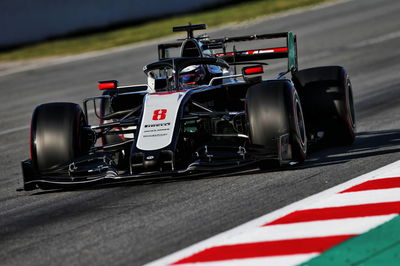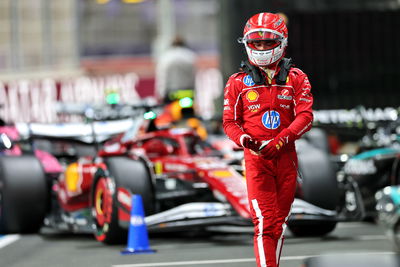The pros and cons of a Vettel and Mercedes F1 alliance
As the dust begins to settle on the news of Sebastian Vettel’s impending departure from Ferrari, attention now turns to what direction the German’s Formula 1 future will take.
Ultimately, Vettel has been left with few clear options for his F1 swansong.
There is a seat available at Renault alongside Esteban Ocon with Daniel Ricciardo switching to McLaren to fill the void left by the Ferrari-bound Carlos Sainz, but that would mean stepping down into F1’s midfield with a team that is not currently in a position to win races.
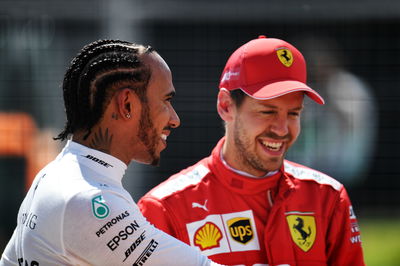
As the dust begins to settle on the news of Sebastian Vettel’s impending departure from Ferrari, attention now turns to what direction the German’s Formula 1 future will take.
Ultimately, Vettel has been left with few clear options for his F1 swansong.
There is a seat available at Renault alongside Esteban Ocon with Daniel Ricciardo switching to McLaren to fill the void left by the Ferrari-bound Carlos Sainz, but that would mean stepping down into F1’s midfield with a team that is not currently in a position to win races.
Red Bull - the team with which Vettel claimed four successive titles between 2010 and 2013 - has all but ruled out a reunion with Christian Horner saying such a prospect is “enormously unlikely” considering it already fields Max Verstappen.
Mercedes now appears to be Vettel’s last-remaining hope of landing a front-running drive, with the reigning world champion squad yet to confirm its line-up for 2021 and beyond. There is also the possibility that Vettel, who turns 33 in July, could take a sabbatical or walk away from the sport for good.
The Mercedes rumours have been gathering pace in recent days, with German media outlets reporting that Vettel has already decided it is Mercedes or bust for 2021.
While Mercedes boss Toto Wolff said his team “cannot ignore” the development of Vettel’s impending exit, he has remained coy about potentially making a move for the four-time world champion and stressed that Mercedes remains committed to its current driver pairing.
Lewis Hamilton and Valtteri Bottas are both out of contract at the end of the year but all the stars would point towards both remaining at the Silver Arrows heading into 2021.
Hamilton’s extension is understood to be a formality and the Briton is expected to remain at the team which has guided him to five of his six world championship triumphs, while Bottas is also likely to be retained for at least another season.
However, recent reports claim that Wolff and Daimler, the parent company of Mercedes, are at odds over what to do for next season, with the latter “pushing hard” to secure Vettel’s signature.
But just how likely is Mercedes to breakaway from its current status quo and gamble on Vettel?
Why Vettel to Mercedes could work
A Vettel-Mercedes partnership would certainly have its merits.
Being teammates with Hamilton would result in Mercedes boasting F1’s two most successful drivers of the past decade in its line-up.
The pair have dominated the sport for the last 10 years, having claimed 10 titles between them and sealed all but one of the championships on offer since 2010.
From a performance point of view, it makes sense. Vettel and Hamilton are the best two drivers on the market, backed up by their immensely impressive records. It might even inspire Vettel to rediscover his previous excellent level of performance and hit the heights he is capable of achieving.
Having a German driver in a German team would also be great for the Mercedes brand, something Wolff admitted in a recent interview.
Expanding on the criteria Mercedes considers when selecting its drivers, he added: “You look at race results, back into the junior formulas, you look at comparisons with team mates and how these teammates compared to other people, and then there is the personality side, which is very important.
“How would the driver fit into the team structure? What would the dynamic be with the driver who could be his team mate? What’s the planning for the future?
“All these factors are being in a way compounded. We are discussing that in a forum, everyone gives their opinion, and most often everybody in that group has the same opinion anyway.”
Personality is another attribute Vettel exudes in abundance, and the great admiration and respect Hamilton and Vettel share for one another in recent years suggests a partnership could work.
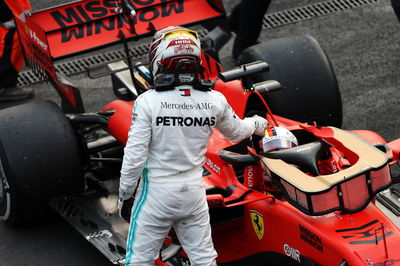
Why Vettel to Mercedes is a no-go
Arguably, the biggest reason that would deter Mercedes from making a move for Vettel would be the risk of upsetting the apple cart and potentially destabilising the formidable and settled foundations Mercedes has built its recent success on.
A Hamilton-Vettel partnership might result in a repeat of the fierce rivalry that flared up between Nico Rosberg and Hamilton and threatened to engulf the entire team at its height in 2016.
Since Rosberg’s bombshell retirement from F1 and the subsequent arrival of Bottas, all has been well at Mercedes. The German manufacturer has gone on to continue its supremacy of the V6 hybrid era without any major dramas.
As Red Bull team principal Christian Horner alluded to, having two ‘alpha males’ in the same team environment could do more harm than good if internal politics brewed and both drivers began taking points off each other and, even more crucially, caused the team to lose points towards the all-important constructors’ standings.
Bottas currently plays the perfect role for Mercedes in being fast enough on his day to challenge and sometimes beat Hamilton. When Hamilton wins, he will rack up the podiums and points - a vital factor behind the team’s recent streak of championship victories. Importantly, he has also supported Hamilton when required in the title fight.
Vettel is unlikely to show willingness to do the same, and losing that backup figure could prove costly to Mercedes in a year when Red Bull and Ferrari would likely cast Alex Albon and Sainz in a similar role if they needed to boost Verstappen and Leclerc’s respective championship chances.
As well as potentially undermining the current strong team harmony that exists at Mercedes, Vettel’s stuttering form over the last two years also represents a gamble. Winning just one race in over 12 months, as well as being dethroned by Leclerc, will have undoubtedly dented Vettel’s confidence, and there are no guarantees he could turn it around.
There would also be the knock-on effect to Mercedes’ junior programme that must be considered, which would seemingly go against any ‘long-term strategy’ to promote George Russell from Williams or even recapture Ocon from Renault in the coming years.
Realistically, the prospect of a Hamilton-Vettel partnership seems remote at best, but you can never rule out another shock twist in this unpredictable and ever-changing driver market tale.
